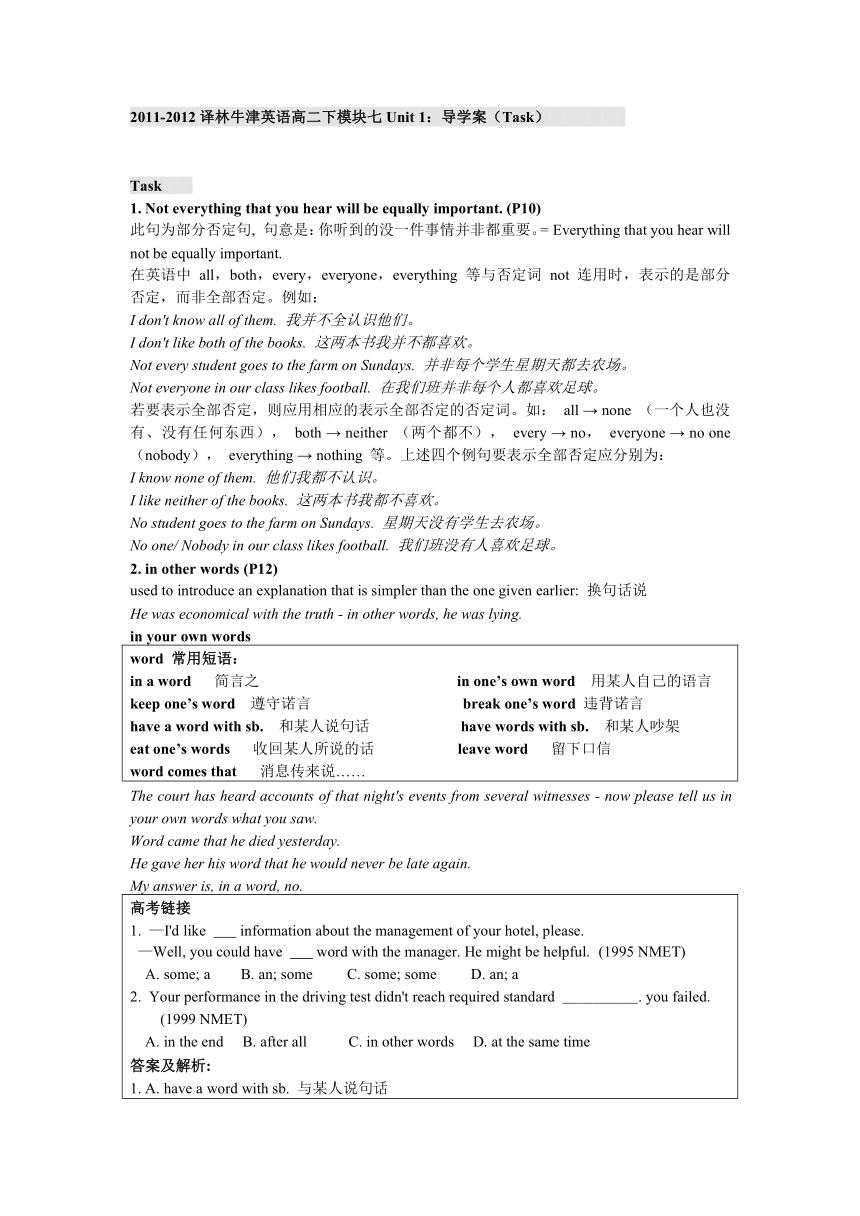2011-2012译林牛津英语高二下模块七Unit 1:导学案(Task)
文档属性
| 名称 | 2011-2012译林牛津英语高二下模块七Unit 1:导学案(Task) |

|
|
| 格式 | zip | ||
| 文件大小 | 11.6KB | ||
| 资源类型 | 教案 | ||
| 版本资源 | 牛津译林版 | ||
| 科目 | 英语 | ||
| 更新时间 | 2011-11-21 00:00:00 | ||
图片预览

文档简介
2011-2012译林牛津英语高二下模块七Unit 1:导学案(Task)
Task
1. Not everything that you hear will be equally important. (P10)
此句为部分否定句, 句意是:你听到的没一件事情并非都重要。= Everything that you hear will not be equally important.
在英语中 all,both,every,everyone,everything 等与否定词 not 连用时,表示的是部分否定,而非全部否定。例如:
I don't know all of them. 我并不全认识他们。
I don't like both of the books. 这两本书我并不都喜欢。
Not every student goes to the farm on Sundays. 并非每个学生星期天都去农场。
Not everyone in our class likes football. 在我们班并非每个人都喜欢足球。
若要表示全部否定,则应用相应的表示全部否定的否定词。如: all → none (一个人也没有、没有任何东西), both → neither (两个都不), every → no, everyone → no one(nobody), everything → nothing 等。上述四个例句要表示全部否定应分别为:
I know none of them. 他们我都不认识。
I like neither of the books. 这两本书我都不喜欢。
No student goes to the farm on Sundays. 星期天没有学生去农场。
No one/ Nobody in our class likes football. 我们班没有人喜欢足球。
2. in other words (P12)
used to introduce an explanation that is simpler than the one given earlier: 换句话说
He was economical with the truth - in other words, he was lying.
in your own words
word 常用短语:in a word 简言之 in one’s own word 用某人自己的语言keep one’s word 遵守诺言 break one’s word 违背诺言have a word with sb. 和某人说句话 have words with sb. 和某人吵架eat one’s words 收回某人所说的话 leave word 留下口信word comes that 消息传来说……
The court has heard accounts of that night's events from several witnesses - now please tell us in your own words what you saw.
Word came that he died yesterday.
He gave her his word that he would never be late again.
My answer is, in a word, no.
高考链接1. —I'd like information about the management of your hotel, please. —Well, you could have word with the manager. He might be helpful. (1995 NMET)A. some; a B. an; some C. some; some D. an; a2. Your performance in the driving test didn't reach required standard _____. you failed. (1999 NMET)A. in the end B. after all C. in other words D. at the same time答案及解析: 1. A. have a word with sb. 与某人说句话2. C. in other word. 换句话说.
Task
1. Not everything that you hear will be equally important. (P10)
此句为部分否定句, 句意是:你听到的没一件事情并非都重要。= Everything that you hear will not be equally important.
在英语中 all,both,every,everyone,everything 等与否定词 not 连用时,表示的是部分否定,而非全部否定。例如:
I don't know all of them. 我并不全认识他们。
I don't like both of the books. 这两本书我并不都喜欢。
Not every student goes to the farm on Sundays. 并非每个学生星期天都去农场。
Not everyone in our class likes football. 在我们班并非每个人都喜欢足球。
若要表示全部否定,则应用相应的表示全部否定的否定词。如: all → none (一个人也没有、没有任何东西), both → neither (两个都不), every → no, everyone → no one(nobody), everything → nothing 等。上述四个例句要表示全部否定应分别为:
I know none of them. 他们我都不认识。
I like neither of the books. 这两本书我都不喜欢。
No student goes to the farm on Sundays. 星期天没有学生去农场。
No one/ Nobody in our class likes football. 我们班没有人喜欢足球。
2. in other words (P12)
used to introduce an explanation that is simpler than the one given earlier: 换句话说
He was economical with the truth - in other words, he was lying.
in your own words
word 常用短语:in a word 简言之 in one’s own word 用某人自己的语言keep one’s word 遵守诺言 break one’s word 违背诺言have a word with sb. 和某人说句话 have words with sb. 和某人吵架eat one’s words 收回某人所说的话 leave word 留下口信word comes that 消息传来说……
The court has heard accounts of that night's events from several witnesses - now please tell us in your own words what you saw.
Word came that he died yesterday.
He gave her his word that he would never be late again.
My answer is, in a word, no.
高考链接1. —I'd like information about the management of your hotel, please. —Well, you could have word with the manager. He might be helpful. (1995 NMET)A. some; a B. an; some C. some; some D. an; a2. Your performance in the driving test didn't reach required standard _____. you failed. (1999 NMET)A. in the end B. after all C. in other words D. at the same time答案及解析: 1. A. have a word with sb. 与某人说句话2. C. in other word. 换句话说.
